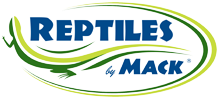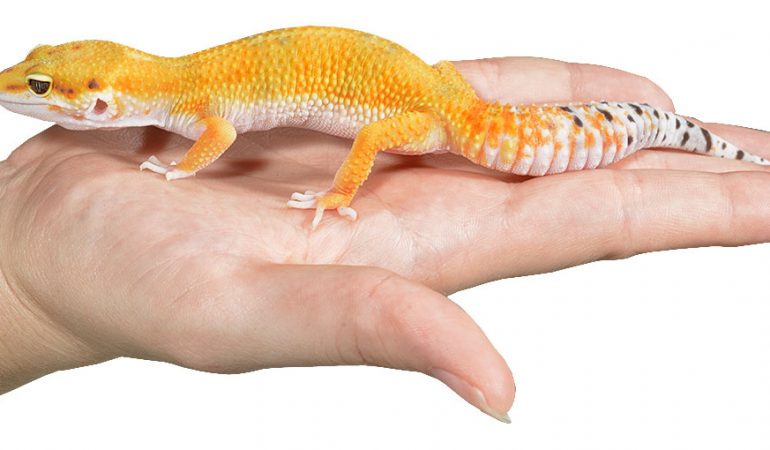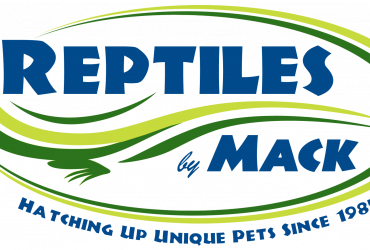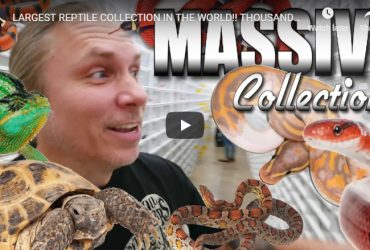Reptile Health and Care
You Love Animals and So Do We!
You may be aware of allegations by PETA against our animal care facilities and practices that were made back in February of 2016. I want to assure you that we take very seriously our reputation as a respected and credentialed reptile supplier.
We found numerous discrepancies in the photos and video and report that much of what you may see could easily be misunderstood within the full context of the setting that isn’t available in these videos.
The PETA allegations reflect care that is absolutely not up to our standards; this type of animal treatment is not how we train our employees and will never be tolerated in any of our facilities.
Our customers look to us for healthy animals that are bred and raised in a safe environment that includes appropriate medical treatment for all of our animals. We train employees to carefully prepare and ship our animals, providing an environment that is appropriate for each breed’s unique lifestyle needs. And, an experienced veterinarian, who specializes in reptile care, visits all of our facilities at least once a week and provides oversight guidance to us.
We expect all employees to follow humane and timely methods to care for our animals. And we discipline or terminate any employees who do not fulfill their obligations of care to our animals.
We took very seriously these old allegations by PETA and we conducted a thorough investigation. We addressed any issues of noncompliance with particular employees and are confident that all employees today are fully aware of and in compliance with all policy and procedure guidelines.
Thank you for your trust in Reptiles by Mack. We work every day to earn that trust.
Sincerely,
John Mack
Update – March 11th, 2016
1. What are the discrepancies you say you have found in the photos, video and report?
a. There are many.
b. For instance, our animals are never denied veterinary care. We have a veterinarian on-site once a week. We isolate our sick and injured animals to avoid infecting other animals. And, if the animal’s health requires immediate attention we contact out vet.
c. The employees who perform euthanasia are trained according to 2015 AVMA (American Veterinary Medical Association) guidelines, which includes a discussion of secondary actions.
d. When we used glue traps we checked them daily and used a vegetable oil to remove any animals and they would be set up in their habitats. However, we no longer use glue traps or tape traps.
e. Water is never withheld from our animals. Each breed has different requirements for water, light, heat, bedding, etc. We work very hard to simulate the natural environment for our animals; those natural environments can easily be misunderstood by looking at a staged photo or incomplete video frame.
f. Animals are never packed more than 24 hours in advance of shipping, and in all cases are packed the day of shipment.
g. Injured and sick animals are immediately cared for and housed according to their injury or illness, being isolated if that is what is appropriate.
h. We take great care in our Bearded Dragon females, our breeders. They are placed in their laying habitats at appropriate times (again, simulating their natural environment). They lay their eggs during the day, as is their nature; and because they are diurnal (active during the day) they do not eat or drink at night. All Bearded Dragons have scheduled feedings of three times a day. The babies are fed at least six times per day. We operate seven days a week, three hundred and sixty five days a year without exception, including Holidays.
i. For all snake species, we record when they are fed, when they eat, and when they don’t eat to ensure they are receiving an appropriate amount of food. Over-feeding can be as dangerous to animals as under-feeding.
2. How many times, or for how long, do your reptiles breed?
It varies by species, for example:
Bearded Dragons – for no more than 3 seasons and are retired at 4 years old, whichever comes first.
Leopard Geckos- are retired out after 6 years.
3. What do you with your reptiles after they are no longer breeding for you?
Reptiles by Mack only breeds our Bearded Dragons for 3 seasons or until they are 4 years old, whichever comes first. When we stop breeding them, we continue to care for them, often offering them to wholesale customers to be sold as pets, because they make great pets.
4. Do you have special living quarters or care plans for your breeders?
Reptile mothers are as special as any mothers. Our breeders are cared for in the best way, recognized by our industry. It varies by species.
5. Why do you use tape traps or glue traps? Isn’t there a better way to do this?
When we used glue traps we checked them daily and used a vegetable oil to remove any animals and they would be set up in their habitats. However, we no longer use glue traps or tape traps.
6. What are your euthanasia policies?
We follow the 2015 AVMA (American Veterinary Medical Association) guidelines.
7. How many employees have this job?
2 employees have this responsibility; both are management level and highly experienced with all reptile species.
8. Do you have a sick bay for each species?
We have a sick bay for each species and once they are entered into a sick bay their presence in the sick bay and all relevant information is recorded into a medical log book.
9. You’ve said you have a veterinarian visit once a week, but what if you have an animal that needs to be seen sooner?
Staff are trained to contact their manager immediately if any animal is injured or there is a concern regarding an animal’s health or well-being. If an animal needs to be seen sooner, our veterinarian will come out the same day.
10. Have you ever had an animal either die or be put down before the veterinarian could get there?
This does happen, very infrequently, sometimes animals – just like people – die for no apparent reason and without displaying any symptoms.
11. Is your veterinarian an expert in reptiles?
Yes, all of his licensure and certifications are current and he continually earns continuing education hours.
12. What are your watering and feeding schedules?
We have set scheduled watering and feeding for every species, dependent on the species specifics and seasonal needs. Our staff are trained to watch for any signs that the animal is not thriving in its environment.
13. Who has oversight of this?
Our team leaders, along with the species’ care technicians, execute the watering and feeding and managers oversee that all is executed correctly.
14. What safeguards does Reptiles by Mack have to ensure proper animal practices?
We have written Procedures and Policies for each species and department. We also provide training to all of our employees. Managers, including senior management, offer walk through the facility checking on the animals and staff to ensure policies and procedures are being followed and to address and questions or concerns our employees may have.
15. How long have these been in place?
We have always had these in place.
16. What kind of training do your employees get? And, how often are they retrained?
Employees are trained from the first day they start on the written procedures and policies and have these procedures demonstrated by a manager or a team leader. Employees are retrained on procedures at least every six months, sooner if so determined by the manager or team lead.
17. What action has been taken against the Reptiles by Mack employees who were recorded in the video released by PETA?
After a thorough investigation into the situation, we met with our current employees shown or heard in the video and discussed the video and the allegations made by PETA. However, those employees who apparently created and then provided the video to PETA voluntarily resigned employment before this video was released and unfortunately, did not bring any of their concerns or these allegations to our attention directly or through the use of our locked Employee Suggestion Box. All current employees shown or heard were provided additional training and/or were disciplined for policy violations and failing to provide the love we require for all of our animals.
18. Is an investigation currently underway into these allegations?
Yes, we are continuing to carefully and thoroughly investigate and monitor our employees and will take swift action with any non-compliant employees. However, we can already rebut or refute each allegation made in the report.
19. Do you allow your customers to inspect your facilities?
We have an open door policy for all of our wholesale customers and various other industry professionals where they may arrive for a full tour during business hours, unannounced. Many of our wholesale customers perform announced and unannounced inspections of our facility several times a year. We have nothing to hide and always receive outstanding feedback from those who see how we really take care of our animals and the standards that we maintain.
Update – March 25th, 2016
Q. How often do you feed your Bearded Dragons?
A. All Bearded Dragons have scheduled feedings of three times a day. The babies are fed at least six times per day. Our produce truck delivers fresh vegetables three times per week to both of our facilities. Each week our Bearded Dragons consume a large portion of the 1 million crickets and 2 million mealworms that we also use each week. We feed our Bearded Dragons seven days a week, three hundred and sixty five days a year without exception, including Holidays.
Q. How much water do Bearded Dragons need?
A. The most common subspecies (Pogona vitticeps) that we carry was originally from Central Australia which includes some of the driest and most hostile desert environments on Earth. Because of this, these Bearded Dragons are extremely efficient at conserving water and they get most of their water from the various plants and the insects that they consume. So much so, some Bearded Dragons will not drink from a water dish as standing water is something they may never see in the wild.
Q. What do you with your Bearded Dragons after they are no longer breeding for you?
A. Reptiles by Mack only breeds our Bearded Dragons for 3 seasons or until they are 4 years old, whichever comes first. When we stop breeding them, we continue to care for them, often offering them to wholesale customers to be sold as pets, because they make great pets. Bearded Dragons live for up to 10 years in captivity but much less in the wild as is with many reptile species.
Q. I saw a picture of some African Sideneck Turtles with no water. Will this harm them?
A. Pictures can be easily misunderstood. Our water Turtles actually are housed in a heated building for a short while and they do have clean, fresh water to swim in, a dry place to bask, a basking light as well as UV lighting and they are fed daily. In the wild, they come from a very harsh environment where the water source may dry up completely. They will then burrow into the mud where they will remain for several months at a time with no food, water, light or heating. By understanding how these resilient little creatures actually live in the wild, you can be assured that they are completely fine in our facilities for a short time without water, while their homes are being cleaned or while they are being carefully shipped overnight to our customers.
Q. How do you ship your animals?
A. We ship all of our orders, safely and carefully, every time. Once we receive your order, we always check the minimum and maximum temperatures to make sure that it’s safe for the animals and if so, they are carefully shipped to our customers all over the USA.
Q. How are your animals housed?
A. This depends on the species. Many of our reptiles including Juvenile Leopard Geckos, Snakes and Adult Veiled Chameleons are housed individually. Some of our more social reptiles do much better when they are in habitats with others of the same size. We know this as species like Bearded Dragons will usually gather in the basking spot of their cage which can give the appearance that it’s crowded, especially if you only see a photo showing the basking area where they are positioned.
Q. How often are the animal habitats cleaned?
A. All animal habitats at Reptiles by Mack are thoroughly cleaned at least one a week however, baby bearded dragon habitats are cleaned out every other day and the larger sub adults are cleaned twice per week. Our animal’s habitats are also spot checked throughout the week as we routinely feed and care for them. Our cleaning routine includes scrubbing each habitat as well as washing and sanitizing the various trays to ensure that our animals are kept in a clean, healthy environment.
Q. Can you tell me about the “glue traps” that you used to use?
A. In the past, we used mild, self-made glue traps where any escaped animals could be quickly contained and carefully and easily released with the help of a mild vegetable oil. This is the same method that some researchers will use in the wild to trap, study and release reptiles safely and unharmed. These traps were all in plain sight and were checked daily to ensure that any escaped animals could be put back in their own habitats. However, we no longer use glue traps.
Q. Why don’t you quickly euthanize any sick or injured animals?
A. Some animals do occasionally get sick or injured but it is our policy to try and save as many animals as possible. Over the last 30 years we have gained experience in treating sick or injured animals and we have a sick bay in each of our animals departments in order to help nurse any animals back to health. With the help of our experienced reptile veterinarian, our success rate for the animals that we treat is high as we have found that most of the animals that we treat do recover and live very healthy productive lives.




